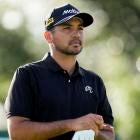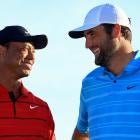Rory McIlroy has always been candid about pretty much everything and especially so in recent months about his plans for 2019. There was an end-of-year kerfuffle over whether he would prioritize the European Tour and get his non-major and non-WGC events in to keep membership. It sounds like he probably will, but also sounds like it's not really a priority for him in 2019.
"It's so one-sided," McIlroy told reporters at the Sentry Tournament of Champions this week about playing on the PGA Tour, which he will put an emphasis on this year.
"Look, you can talk all you want about these bigger events in Europe, but you can go to America and play for more money and more ranking points. I think as well with the world ranking points, everyone out here, all of their contracts with sponsors, it's all about world ranking points. If players are getting paid more and earning more world ranking points, why would you play over there?"
McIlroy's appearance at the Tournament of Champions is evidence of this new strategy (lifestyle?) he'll employ for the foreseeable future. Though he's qualified nearly every year by winning the year before, McIlroy has never played in the event until this year.
It remains to be seen whether a shift in his mentality will help him on the course, but I'd be surprised if the entire thing wasn't tied back to some of the lessons he took away from the book Essentialism. Karen Crouse wrote brilliantly about this in a New York Times piece back before the Ryder Cup.
McIlroy said he found his own guide for pruning his life in the book, "Essentialism," by Greg McKeown, with a subtitle that reeled McIlroy in: "The Disciplined Pursuit of Less."
"It helped me learn to say, 'No,'" McIlroy said.
McKeown said he understood what McIlroy meant. Both people and corporations, he contended in an interview, tend to start out with a clarity of purpose that fuels their success. But the realization of their ambitions can trigger an avalanche of opportunities and options that become obstacles in their path.
It's a fascinating concept that is rare air for athletes and rarer still that they would consider it. On the course, it's clear that collecting as many majors as possible (including the Masters) is McIlroy's singular focus, and if he feels that eschewing the early European Tour schedule and getting into an earlier-than-normal rhythm in the PGA Tour season is the best way to do that, then I can't fault him.
"The ultimate goal is here," McIlroy told reporters regarding the PGA Tour. "The European Tour is a stepping stone. That's the truth. The European Tour is a stepping stone. That's the way it is. It's tough. I still want to support the European Tour, and I talk about this loyalty thing with Europe. … [But] it's not as though I'm just starting out and jumping ship. I've done my time. I've done everything I feel like I need to do to say OK, I'm going to make my own decisions and do what I want."
McIlroy is technically correct -- the European Tour purses and OWGR points are inferior to the PGA Tour's -- and history would suggest this is how all players (not just him) view it, too. When a European Tour player gets good enough to contend on the PGA Tour -- Justin Rose, Henrik Stenson and Sergio Garcia come to mind -- they come to the PGA Tour and normally stay there.
There's a way to sort of cater to both, I guess, and I think the schedule dovetail in 2019 will help players like McIlroy, but I also think those schedule changes combined with the place McIlroy is at in his life have created a situation in which it's full steam ahead on this side of the pond early on in the calendar year for most of the rest of his career.





















